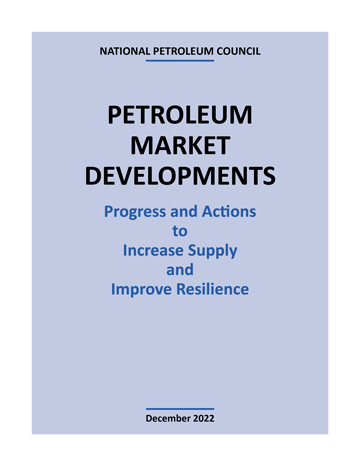
Petroleum Market Developments – Progress and Actions to Increase Supply and Improve Resilience (2022)
Affordable energy is essential to help improve the quality of life for global citizens and to help economic growth. The global energy system is both large and complex. The last three years have seen dramatic changes in energy demand and supply caused initially by the COVID pandemic and then the Russian invasion of Ukraine.
While this experience has shown the resilience of the global energy system, it has also again demonstrated the need to allow the energy markets to function as efficiently as possible to avoid disruption. This report discusses a number of key areas where industry and the administration can continue to work together to ensure the energy markets are as efficient as possible. These include ensuring continued free access to imports and exports of natural gas, crude oil, and refined products, removing barriers to supply such as permitting of production and processing, and enabling low-cost transportation for all types of energy.
This report also discusses steps that should be taken to help respond to disruptions caused by hurricanes, cyber-attacks, and physical attacks.
Full Report (120 pages)
View/download a PDF of the printed report:
Normal resolution (9.2 MB)
Print-on-demand versions are available for purchase at Amazon.
Emergency Preparedness Implementation Addendum (2016)
The NPC members, through approving the 2014 NPC report Enhancing Emergency Preparedness for Natural Disasters, made a commitment to follow through with DOE and support implementation of the recommendations. In April 2016, DOE held the fourth annual “Clear Path” energy sector preparedness exercise and changed the exercise from an academic session format of earlier Clear Path exercises and more toward a functional exercise. This exercise provided an opportunity to observe and document the implementation of the 2014 NPC report recommendations.
The exercise planning, observation, and feedback built upon previous work completed by DOE and industry in working toward implementing the NPC report recommendations. The move to a functional exercise created the opportunity for industry and government to work together not just during the exercise, but during the planning and review processes. The 2016 NPC Implementation Addendum is a presentation and working paper that is the output of this effort, providing a detailed summary on progress in implementing the 2014 NPC report recommendations and opportunities for improvement.
View/download PDFs of the 2016 NPC Implementation Addendum:
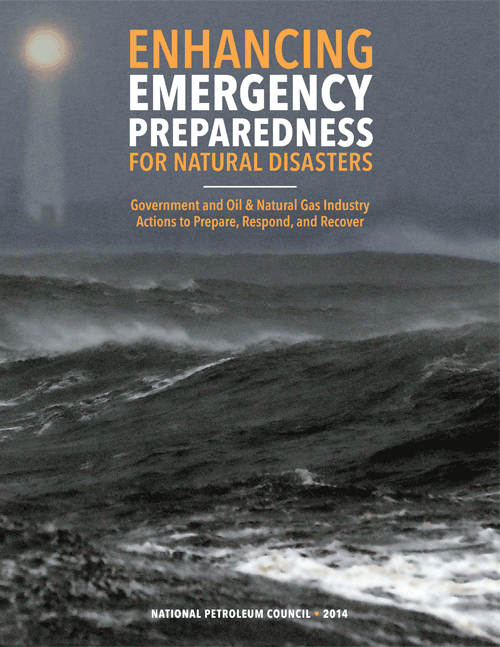 Enhancing Emergency Preparedness for Natural Disasters (2014)
Enhancing Emergency Preparedness for Natural Disasters (2014)
The National Petroleum Council (NPC) undertook this study at the request of the Secretary of Energy to examine the critical issues regarding the resiliency and reliability of the nation’s oil and natural gas infrastructure to natural disasters and to identify options that would enable both government and industry to better prepare for, respond to, and recover from such events.
This report identifies a number of findings and 25 recommendations across four key themes:
- Cross-Sector Collaboration
- Information Sharing
- Government Coordination
- Industry Actions.
This report will be provided to the Secretary of Energy and be made publicly available via the NPC website.
Full Report (168 pages)
View/download a PDF of the printed report:
Low resolution (15.8 MB)
Click here to view/download an ePUB version of the printed report (10.8 MB)
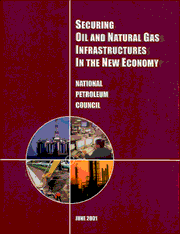 Securing
Oil and Natural Gas Infrastructures
Securing
Oil and Natural Gas Infrastructures
In the New Economy (2001)
This NPC report suggests actions for identifying and reducing infrastructure vulnerabilities within the oil and natural gas industries. It presents the case for moving forward in the new business environment, adopting critical infrastructure protection thinking as part of the foundation of acting in the best interests of a company. It identifies the issues and the steps forward that the oil and natural gas industries and the government will need to implement to ensure the integrity and continuity of the industries’ infrastructure.
This report’s recommendations are intended to be dynamic, reflecting the fact that the industry is in the midst of significant change. Even the understanding of critical infrastructure protection is still evolving. Energy infrastructures are inextricably linked with other critical infrastructures, and, as a result, the report takes a holistic perspective on critical infrastructure protection.
(100 pages)
View/download a .pdf of the printed report:
Normal resolution (1.5 MB),
or click here to download the order form for printed copies.
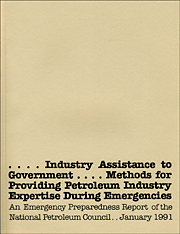
Industry Assistance to Government – Methods for Providing Petroleum Industry Expertise During Emergencies (1991)
The report was prepared in response to a request from the Secretary to recommend methods of government/industry cooperation to use in varying stress situations, particularly national security emergencies. The NPC report recommends three types or levels of petroleum industry assistance in energy emergencies, depending on their nature and severity. The response levels include: company emergency contacts, executive advisory groups, and a petroleum National Defense Executive Reserve. The report presents a detailed discussion of each response level, the practical and legal aspects of the various methods, and recommendations on the mission, organization, and rules of operation of each.
Printed report: (130 pages)
View/download a .pdf of the printed report:
Normal resolution (54.5 MB)
Low resolution (14.1 MB)
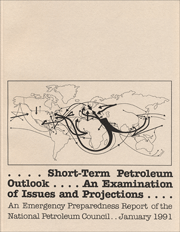 Short-Term Petroleum Outlook –
Short-Term Petroleum Outlook –
An Examination of Issues and Projections (1991)
The report discusses significant issues relating to the short-term worldwide supply and demand for crude oil and refined petroleum products following Iraq’s invasion of Kuwait. The report, prepared prior to the successful “Operation Desert Storm,” places emphasis on ways in which the complex but flexible petroleum distribution system could be expected to deal with the effects of various types of problems. The issue of most immediate interest and concern was the potential effect of a significant further disruption of petroleum exports from the Middle East. The Council’s report recommended several actions to ensure that the impact of such a disruption on military needs and the U.S. economy, if it were to occur, would be minimized. The Council also cautioned against certain types of government response that could reduce the ability of the petroleum supply system to respond effectively.
Printed report: (140 pages)
View/download a .pdf of the printed report:
Normal resolution (6.3 MB)
Low resolution (4 MB)
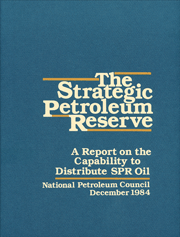 The Strategic Petroleum Reserve:
The Strategic Petroleum Reserve:
A Report on the Capability
to Distribute SPR Oil (1984)
The report examines the capabilities of the Strategic Petroleum Reserve to distribute oil during an emergency and recommends certain changes to ensure the timely and efficient drawdown, distribution, and refining of SPR crude oil. The study assesses the capabilities of four operational areas: SPR facilities, the overland distribution system, the marine distribution system, and the domestic refining industry. These areas are studied under three distinct cases: 1983 actual conditions, a 1990 nondisrupted case, and a 1990 disrupted case.
Printed report: (296 pages)
View/download a .pdf of the printed report:
Low resolution (17.1 MB)
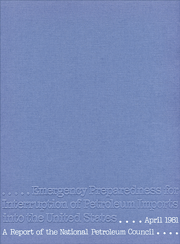 Emergency Preparedness for Interruption of Petroleum Imports into the United States (1981)
Emergency Preparedness for Interruption of Petroleum Imports into the United States (1981)
The report discusses emergency preparedness plans for oil import disruptions, specifically addressing emergency demand reduction and fuel substitution options, inventories and strategic stocks, emergency oil and gas production, emergency refining operations, emergency logistics operations, international considerations, and emergency industry/ government operations. The study examines potential emergencies stemming from major cutoffs of oil imports into the United States and does not deal with public issues related to petroleum industry operations in non-emergency conditions.
Printed report: (512 pages)
View/download a .pdf of the printed report:
Low resolution (13.2 MB)